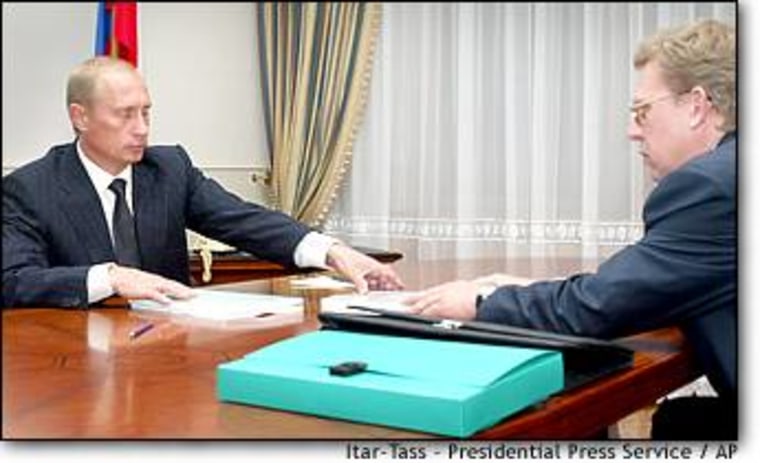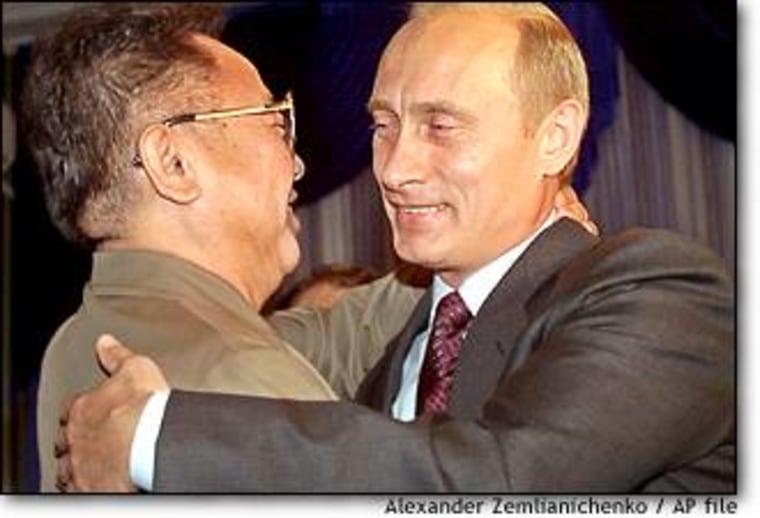When it comes to the global war on terrorism, President Vladimir Putin talks the talk. The Russian leader even walks the walk, although in a direction that appears increasingly to stray from the path plotted by the Bush administration.
Si far this year, Putin has met the leaders of Iran and North Korea, two nations denounced by President Bush as part of an “axis of evil.” Then in August, to the dismay of the United States, Russia signed a $40 billion trade deal with the other “axis” nation: Iraq.
Now, the latest example of Putin’s agenda came this week after he called Bush to offer Russia’s commiseration on the one-year anniversary of Sept. 11, a date in infamy, but one that also marked the start of a cozier relationship between the two powers.
Or so it seemed. After all, it was Putin who earned Bush’s heart-felt gratitude by calling him up shortly after the attacks, saying that Russian nuclear-armed forces would be taken off their automatic state of high alert, allowing the Americans to concentrate on the immediate dangers at hand.
But the Russia leader wasn’t done. On the 9/11 anniversary, Putin also drafted a letter to the United Nations and the Organization for Security and Cooperation in Europe, threatening war on the neighboring republic of Georgia — and seeking the blessing of the world community for military action.
Putin — ensconced in his vacation home in the Black Sea resort of Sochi — accused Georgia of harboring Chechen rebels and terrorists, saying the nation had violated the United Nation’s anti-terrorism resolutions and warned Russia would act unless Georgia quelled the threat.
With a deft sense of timing, the menace of a pre-emptive military assault on an sovereign nation was made public only hours before Bush sought to rally a skeptical global community about the need to launch a military strike on Iraq, which he said was defying the will of the United Nations.
The implication seemed apparent and the Russia media were blunt in their assessment of Putin’s strategy. “Russia is offering the USA a deal: Iraq in exchange for Georgia,” the Kommersant business daily wrote.
STUCK IN THE MIDDLE
The tiny Caucasus republic has become accustomed to being stuck in the middle. Ever since grasping the chance for independence following the collapse of the Soviet Union, the nation has been wracked by conflict.
Some of it is internal, as the nation struggles with demands for self-rule from South Ossetia and Abkhazia. But the hand of the Kremlin hasn’t been far away either, especially as Georgian President Eduard Shevardnadze refused to hew Moscow’s line since independence in 1991.
The combative former Soviet foreign minister under Mikhail Gorbachev has blamed Russia for fomenting unrest.

Under other circumstances, Moscow might dismiss Shevardnadze as a bitter man and a minor irritant. But his nation borders Chechnya, Russia’s Vietnam, a region in permanent and bloody insurrection against Russian hegemony.
The mostly Muslim region defied former President Boris Yeltsin, despite a Russia bombardment that flattened its capital, Grozny, and left tens of thousands dead.
Now, it also is causing Putin grief. Despite the Kremlin’s repeated insistence that the war has been won, the death of 114 Russian soldiers earlier this month, after their overcrowded transport helicopter was shot down by a Chechen rebels, suggested otherwise.
RIGHTS ABUSES
There has been one difference however. Unlike Yeltsin, who suffered the scorn of the world community over human rights abuses in Chechnya, Putin has a free hand, if he chooses to use it.
While human rights groups assert abuses continue, the United States has muted its criticism.
The outgoing chief of the U.N. Human Rights Commission, Mary Robinson, noted the changing standards in her parting shots this week. The former Irish president irritated many nations, including the United States, Russia and China, with her outspoken criticism of the nations’ alleged violations.
“Everything is justified by that T-word,” she told The Associated Press, referring to terrorism. “I hope that countries will put human rights back on the agenda because it tended to slip after Sept. 11.”
As the U.S.-based organization, Human Rights Watch, noted in a report Thursday, Chechens are continuing to “disappear” after their detention by Russian troops.
The latest case was a woman who put her faith in the Russian judicial system after her son disappeared two years ago. But after her efforts proved futile, she filed a case with the European Court of Human Rights. Four months later, in June 2002, her husband also disappeared.
EYE ON PANKISI GORGE
Now, Russia is threatening to escalate its war on Chechen rebels by hunting those allegedly hiding out in the Pankisi Gorge in Georgia.
Defense Minister Igor Ivanov told reporters on Friday that specific attack proposals would be presented to Putin in the near future. He said such strikes “may not be needed” if Georgia takes appropriate measures, the Interfax news agency reported.It’s a strategy that puts the Bush administration in quite a predicament. Not only will the United States have difficulty in disputing Putin’s argument for an attack given its own Iraq agenda, the administration has its own keen interest in the Pankisi Gorge.
A few months ago, the Pentagon spotlighted the inhospitable region as another possible refuge for al-Qaida fighters and sent American soldiers to train the Georgians on how to root them out.
On Thursday, U.S. State Department spokeswoman Julie Reside said the United States strongly supports Georgia’s territorial integrity and would oppose “any unilateral military action by Russia inside Georgia.”
Reside said the United States believes the problems in the Pankisi Gorge should be addressed by the Georgian government. “They are doing so,” she said.
However, if Putin has his way, the Georgian soldiers, fresh from their U.S. training, may be facing a different enemy.
(Sean Federico-O’Murchu is an international producer/editor for MSNBC.com.)
